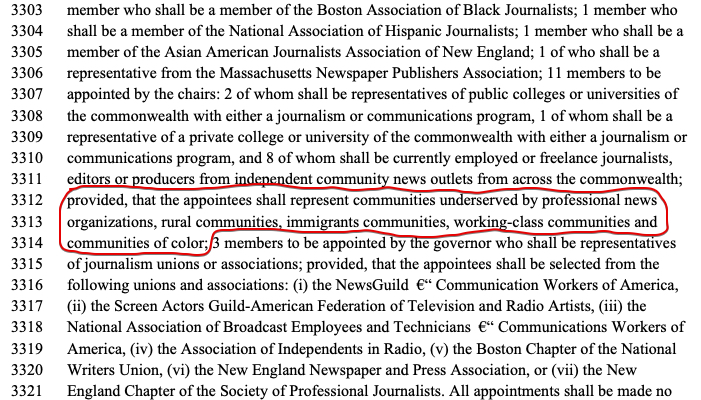A joint press release by the Boston Institute for Nonprofit Journalism and Free Press Action
BOSTON—A grassroots network of Massachusetts journalists and media advocates spearheaded by the Boston Institute for Nonprofit Journalism (BINJ) and Free Press Action played a key role in the recent passage of the Massachusetts journalism commission law. This legislation will establish an advisory body to help the statehouse determine how to best support struggling local-news outlets while preserving newsrooms’ editorial independence.
The incoming co-chairs of the legislature’s Joint Committee on Community Development and Small Businesses will name eight journalism commission members representing independent community news outlets around the state and two members representing public higher education journalism departments.
BINJ and Free Press Action plan to submit names for those journalism commission seats to the committee’s co-chairs. The organizations will propose that the seats be given to representatives of as diverse an array of news outlets as possible. And the groups will seek to ensure that, in the language of the law itself, “appointees shall represent communities underserved by professional news organizations, rural communities, immigrants communities, working-class communities and communities of color.”
BINJ Executive Director Jason Pramas made the following statement:
“Journalists and media advocates from around the Commonwealth worked hard to ensure that the Massachusetts journalism commission membership include a large group of working journalists who run independent community news outlets as well as representatives from public college journalism departments. This will ensure proper representation of both the people who do vital municipal reporting day to day and the people who train many of those reporters in deliberations about how state government can best help improve the fortunes of the local news industry in the interest of democracy. As such, we think it’s appropriate for our grassroots network to have a say in who should get some of those seats. Especially since the rest of the commission’s 23 seats are already earmarked for representatives of specific organizations and the members of the legislature itself.”
Free Press Action Senior Campaign Director Candace Clement made the following statement:
“Massachusetts is setting an example for other states seeking to respond to the local news crisis. Everywhere we look, we see the damaging results of this crisis—with widespread disinformation on everything from voting to the COVID pandemic filling the void left by shuttered local newsrooms. Some of the state’s most vulnerable communities have never been served by local outlets, exacerbating the inequities already in place due to systemic racism. Investing in journalism is an investment in making our communities more equitable, healthy and whole. We urge the co-chairs of the Joint Committee on Community Development and Small Businesses to appoint commission members from the Black, Latinx, LGBTQIA+, poor and working-class communities most impacted by the collapse of local news.”
Contact: Jason Pramas of the Boston Institute for Nonprofit Journalism at 617-209-9511, jason@binjonline.org
###









